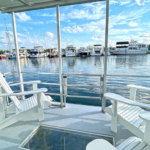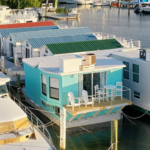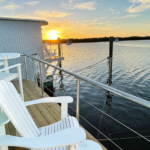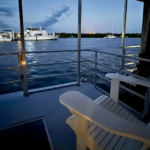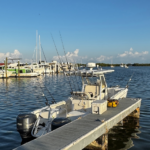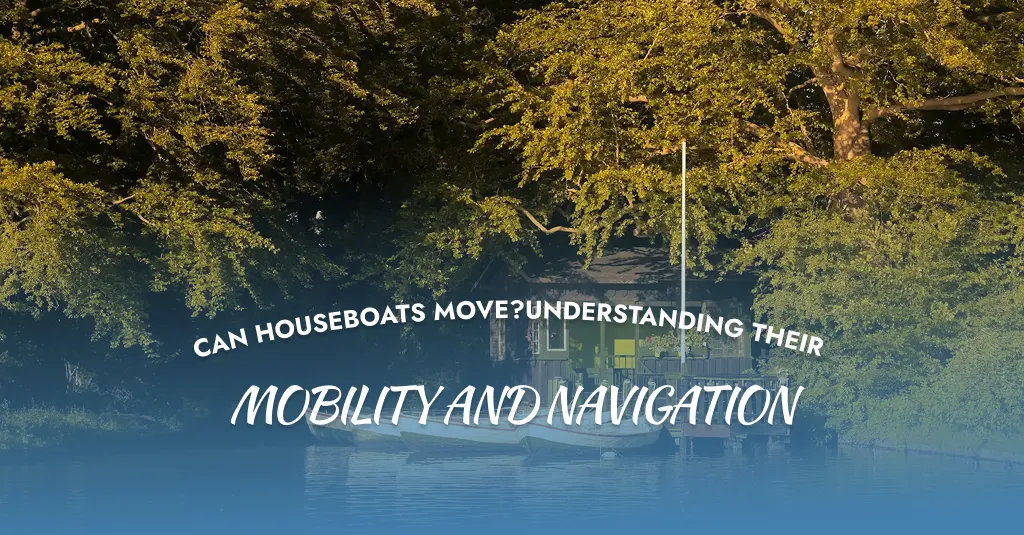
Can Houseboats Move? Understanding Their Mobility and Navigation
Picture yourself sipping coffee on the deck of a houseboat, surrounded by the tranquil waters of the Florida Keys, as captured in the serene beauty of Mangrove Marina. The allure of houseboat living raises a key question: can houseboats move?
At Mangrove Marina in Tavernier, where houseboats like the Aqua Villas offer a unique waterfront experience, understanding houseboat mobility and navigation is essential for anyone considering this lifestyle.
This guide examines whether houseboats can be moved, their motors, speed, and licensing requirements, drawing inspiration from the vibrant marine culture at Mangrove Marina. Let’s dive into the world of houseboats and uncover how they navigate the open waters.
Floating Homes on the Move: Houseboat Mobility
Discover the dynamic capabilities of houseboats, blending the comforts of home with the freedom of the seas. From stationary retreats to cruising vessels, we’ll explore their mobility.
Can Houseboats Move?
Yes, many houseboats can move, offering the flexibility to cruise through waters like those near Mangrove Marina. Unlike static floating homes, houseboats are designed with hulls and propulsion systems, allowing them to navigate rivers, lakes, or coastal areas.
At Mangrove Marina, some houseboats, like the Yellow Tail or Dolphin, are moored but can be moved with motors, as noted on their houseboat rentals page. However, mobility varies: some houseboats are built for frequent travel, while others, like those in Tavernier’s hurricane hole, are primarily stationary, used for liveaboard or vacation stays. This versatility ensures houseboats can move, catering to both adventurers and those seeking a serene retreat.
Powering the Journey: Houseboat Motors
Discover the engines that power houseboats, allowing them to glide smoothly through scenic waterways. From powerful outboards to minimal propulsion, motors define their mobility.
Do All Houseboats Come with Motors?
Not all houseboats come with motors, as their design depends on their intended use. Many houseboats, like those at Mangrove Marina, are equipped with outboard or inboard motors for navigation, allowing owners to explore coastal waters or relocate as needed.
For example, the Starfish and Tarpon at Mangrove Marina’s Aqua Villas may have motors for short trips, though they’re often moored for stability. Stationary houseboats, used as permanent residences, may lack motors or have minimal propulsion for occasional repositioning.
Speed on the Water: Houseboat Travel Capabilities
Explore how fast houseboats can travel, balancing comfort with the thrill of cruising. Their speed shapes the experience of navigating open waters.
How Fast Can a Houseboat Travel?
Houseboats typically travel at modest speeds, prioritizing stability over velocity. Most houseboats, including those at Mangrove Marina, cruise at 5-10 knots (6-12 mph), with some high-performance models reaching 15-20 knots (17-23 mph). Speed depends on hull design, engine power, and load, with pontoon-style houseboats being slower due to their flat bottoms.
For example, a houseboat with twin 150-horsepower outboards, suitable for Florida Keys waters, can hit 10-12 knots, ideal for leisurely trips near Tavernier’s hurricane hole. Faster speeds are less common, as houseboats are designed for comfort, not racing, ensuring a smooth ride while enjoying views like those at Mangrove Marina.
Navigating the Rules: Licensing for Houseboats
Learn the legal requirements for operating a houseboat, ensuring safe and compliant adventures on the water. Licensing is key to responsible navigation.
Do You Need a License to Operate a Houseboat?
Whether you need a license to operate a houseboat depends on the location and vessel specifications. In Florida, including the waters around Mangrove Marina, a boating safety education ID card is required for anyone born after January 1, 1988, operating a vessel with a motor of 10 horsepower or more, as per the Florida Fish and Wildlife Conservation Commission.
Houseboats with motors typically exceed this threshold, so operators often need a boating safety course certificate. No formal license is required for recreational use in most U.S. states, but local regulations, like those in the Florida Keys, may impose additional rules, such as speed limits near mangroves to protect wildlife, as noted in sanctuaries.noaa.gov. Checking with Mangrove Marina’s staff can clarify local requirements for safe navigation.
Houseboats at Mangrove Marina: A Unique Experience
Houseboats at Mangrove Marina, located at Mile Marker 91.7 in Tavernier, offer a blend of mobility and luxury, as highlighted on their houseboat resort page. These Aqua Villas, like Sea Turtle and Captain’s Quarters, are well-appointed with kitchens, flat-screen TVs, and patios, providing a home-like experience on the water. While many are moored for stability, some can move with motors, allowing short excursions to explore the Intracoastal Waterway.
TripAdvisor reviews note their comfort but mention challenges for those with mobility issues due to steps onto the boats, suggesting careful consideration for accessibility. The marina’s amenities, including a freshwater pool and Fin & Juice Bar, enhance the houseboat experience, making it a perfect base for fishing, kayaking, or simply enjoying the sunset.
Environmental Considerations: Navigating Responsibly
Houseboat mobility comes with a responsibility to protect delicate ecosystems like the Florida Keys’ mangroves and coral reefs. Over 300 groundings occur annually in the Florida Keys National Marine Sanctuary, damaging seagrass and coral, critical habitats for manatees and sea turtles, according to sanctuaries.noaa.gov.
Houseboat operators must adhere to low-speed zones and avoid anchoring in sensitive areas. Mangrove Marina’s protected hurricane hole basin minimizes environmental impact, offering a haven for houseboats. Responsible navigation ensures houseboats can move without harming the vibrant marine life that makes Tavernier a paradise.
The Appeal of Houseboat Living
Houseboats offer a unique lifestyle, blending the freedom to move with the comforts of home. At Mangrove Marina, houseboats like Dolphin provide cozy bedrooms, kitchens, and decks for watching manatees or dolphins, as noted in guest reviews.
Their mobility allows owners to explore new waterways or relocate seasonally, though many choose to stay docked for the resort-like amenities, such as the pool and tiki bar. Whether cruising at 8 knots or moored for a romantic getaway, houseboats deliver an unparalleled experience, reflecting the laid-back charm of the Florida Keys.
Set Sail for Adventure
Can houseboats move? Many houseboats, including those at Mangrove Marina, offer the flexibility to cruise with motors, travel at leisurely speeds, and require minimal licensing for operation. Whether you’re dreaming of a mobile aquatic adventure or a stationary retreat, houseboats provide a unique way to experience the Florida Keys.
Book a stay at Mangrove Marina’s Aqua Villas or explore their wet slips and services to start your journey. Live your houseboat dreams, contact Mangrove Marina to plan your next waterfront escape. Embrace the freedom of houseboat living today!
FAQs
Can houseboats at Mangrove Marina be moved easily?
Some houseboats at Mangrove Marina have motors for short trips, but many are moored for stability, requiring professional assistance for relocation.
Are houseboats safe for rough waters in the Florida Keys?
Houseboats are best suited for calm waters like Tavernier’s hurricane hole, as their flat hulls are less stable in rough seas.
What type of motor is best for a houseboat?
Twin outboard motors or diesel inboards are common, offering reliable power for houseboats, with 50-150 horsepower suitable for most models.
Do houseboats require special insurance for mobility?
Yes, houseboats used for navigation typically need marine insurance covering hull damage and liability, especially in busy waters like the Keys.
Can beginners operate a houseboat in Florida?
Beginners can operate houseboats with a boating safety course certificate, required for those born after 1988 in Florida, ensuring safe navigation.

